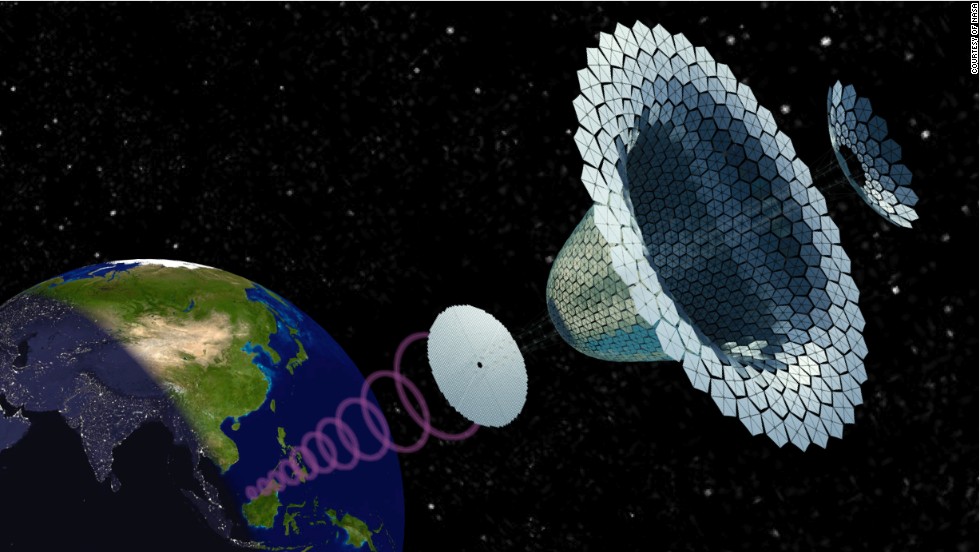 |
| Above: An artists impression of a space based solar power station. Courtesy of NASA |
Well... yes. But looking at this idea gives us a chance to look at some other cool space technologies that are in development too. And, when you examine it closely, there are some advantages to putting solar panels in space:
- The sunlight is simply stronger up there - Earth's atmosphere cuts out a quarter to a half of the Sun's intensity. In space all of it could be collected. Not a huge advantage admittedly (the extra energy doesn't offset the cost of getting the satellite up there) but it's worth mentioning
- There's no nighttime in space, so the power can be generated non-stop.. that overcomes one of the huge inherent problems with solar power on the ground - sunset! Ground based systems can store power in batteries overnight, but that comes with a bunch of its own problems.
- Being in space gets you away from the elements, and the wildlife.weather, wildlife, plant life... all contribute to the wear and tear that means components need constant service and maintenance. By comparison there are solar powered satellites still drawing power after decades without a service.
- A satellite (or a small constellation of them) can beam power anywhere on Earth. This is, in my opinion, one of the areas where space based solar power shows real potential: To pick up power beamed from a satellite all you need is a lightweight mesh antenna. Consider how useful that could be for military forward bases, disaster relief... anything where you need to get power to somewhere inaccessible, fast.
For certain applications - even if not mass power generation - it's a technology worth looking into. But lets look at some of the problems:
- It's expensive, and risky, sending things into space, never mind a huge solar power satellite.
- You have to beam the power back to Earth as microwaves or laser light, which is not such an easy task itself.
- The power transmitting technology is not yet up to snuff .
- But the biggest problem is, and always has been, launching enough solar power stations into space be useful: Conventional rockets are just too expensive it make it cost-effective.
Not quite..... There have been commercial start ups that have tried to develop the technology - Solaren and SpaceEnergy come to mind - and though they've begun in a blaze of glory and faded into nothing they prove there's some commercial interest in the idea. More interestingly the U.S. military have begun researching the idea.
Then there are the technologies being developed that could change things in space solar power's favour: One is re-usable rocket technology, like that being developed by SpaceX, which many hope will bring down the cost of space launches. Another is 3D printing in space - this is a revolution in the making, where launching delicate components into space becomes unneeded - we can just launch the raw materials and have a 3D printer turn out the needed parts! In space satellite re-fuelling and repair is another needed technology that is on the rise. Even the beaming technology is getting better...
Above: A NASA test of wireless power beaming technology.
....but the holy grail for space solar power would be the ability to mine the materials in space, and need no launch at all. At least one company - Planetary Resources - is actively working toward this, but it's still a long way off.
All these things are very much in their infancy, and will have to reach maturity before solar power stations in space can really happen . So watch this promising idea carefully - but don't hold your breath too much...
Elsewhere in the Universe:
Dawn mission provides close ups of Ceres mystery bright spots:
Ancient Pluto may have had rivers of nitrogen.
Dawn mission provides close ups of Ceres mystery bright spots:
Ancient Pluto may have had rivers of nitrogen.
* First printable, relevant, non lunch related thought that is.
No comments:
Post a Comment